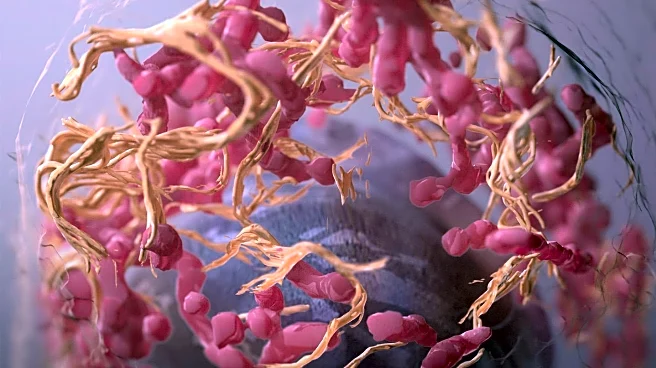What's Happening?
Recent genetic research has identified a specific variant in the ACTB gene associated with Baraitser-Winter cerebrofrontofacial syndrome (BWCFF), a rare congenital disorder. This syndrome is characterized by distinct craniofacial features, intellectual disability, and various congenital anomalies. The study focused on a heterozygous missense variant, NM_001101.5:c.209C>T (p.Pro70Leu), found in a mildly affected infant. This variant was detected through whole-exome sequencing, which is crucial for diagnosing BWCFF. The ACTB gene encodes β-actin, essential for various cellular functions, including cell shape regulation and gene expression. The study highlights the genotype-phenotype correlation, as similar variants have been reported in different populations, suggesting a consistent pattern of symptoms associated with this genetic mutation.
Why It's Important?
The identification of the ACTB gene variant has significant implications for understanding and diagnosing Baraitser-Winter syndrome. This discovery enhances the ability to provide accurate genetic counseling and targeted interventions for affected individuals. The research underscores the importance of genetic studies in uncovering the underlying mechanisms of rare disorders, potentially leading to more effective treatments. For families and healthcare providers, this knowledge can improve management strategies and quality of life for patients. Additionally, it contributes to the broader field of genetic research by providing insights into the role of actin genes in developmental disorders.
What's Next?
Future research is expected to focus on further elucidating the molecular mechanisms by which ACTB variants disrupt normal development. This could involve the use of cellular and animal models to better understand the biological impact of these mutations. Such studies may pave the way for developing therapeutic approaches that target the specific genetic pathways involved in Baraitser-Winter syndrome. Continued investigation into the phenotypic variability associated with ACTB-related disorders will be crucial for advancing personalized medicine and improving outcomes for patients with this and similar genetic conditions.
Beyond the Headlines
The findings from this study also raise ethical considerations regarding genetic testing and counseling. As genetic research advances, the ability to diagnose rare disorders prenatally or early in life increases, posing questions about the implications of such knowledge for families. The potential for early intervention must be balanced with the psychological and social impacts of genetic diagnoses. Furthermore, the study highlights the need for comprehensive genetic databases to support the identification and classification of rare variants, which can aid in the diagnosis and treatment of genetic disorders.










